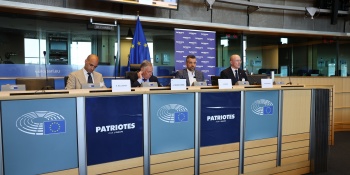Published: 19.01.2023

· The European Parliament has adopted a resolution calling for the establishment of a tribunal for crimes of aggression against Ukraine.
· The new tribunal would deal exclusively with the crime of aggression against Ukraine and would complement the International Criminal Court.
· The ICC has jurisdiction to try war crimes and crimes against humanity committed by Ukraine, but cannot rule on the crime of Russia's aggression against Ukraine itself.
· The resolution adopted by the EP was a joint project of all political factions sitting in the EP.
· The EP's position has no binding force, but it is a signal to the European Commission and the European Council that MEPs support efforts to establish the tribunal.
During the January plenary session of the EP, there was a debate on the initiative to create a special tribunal that would have the competence to judge the crime of Russia's aggression against Ukraine. According to international law, not only the crime of genocide and war crimes committed by the aggressor can be prosecuted (in these cases the International Criminal Court - ICC - has jurisdiction), but also the very fact of an aggression (aggression) of one country against another independent and sovereign state constitutes a violation of the law.
UN General Assembly Resolution 3314 (XXIX) of December 14, 1974 defines aggression as "the use of armed force by a state against the sovereignty, territorial integrity or political independence of another state, or in any other manner inconsistent with the Charter of the United Nations" and states that "aggressive war is a crime against international peace" and that "aggression entails international responsibility."
Also, Article 8 bis of the Rome Statute defines the "crime of aggression" as "the planning, preparation, initiation or execution by a person capable of effectively exercising control over or directing the political or military action of a State, of an act of aggression which, by its nature, gravity and scale, constitutes a clear violation of the Charter of the United Nations." The International Military Tribunal at Nuremberg ruled in 1946 that aggression is even "the supreme international crime."
In the case of Russia's aggression against Ukraine, however, the ICC has no jurisdiction. This is because the crime of aggression is defined in the aforementioned Article 8 bis of the Rome Statute. Meanwhile, neither Ukraine nor the Russian Federation has ratified the Rome Statute and amendments related to the crime of aggression (Ukraine has never ratified, while Russia withdrew from these commitments in 2016).
The solution proposed by the European Commission and supported by the EP today is the creation of a special independent international tribunal based on a multilateral treaty, or a specialized court integrated into the national justice system with international judges. Such a court would be complementary to the ICC - it would deal exclusively with the crime of aggression in Ukraine, while the ICC would deal with war crimes and crimes against humanity committed by the Russians in Ukraine. January 19. The EP almost unanimously adopted a resolution in which it supported the establishment of such a court and called on the entire international community to begin work on its establishment without delay.
"Such a step will require strong support from the UN and essentially the entire international community, but it seems feasible. Resolutions to date by the UN General Assembly, the European Parliament and national parliaments seem to confirm the existence of political will to pursue the idea of establishing a new court. Similar steps have been taken in the past - we are familiar with the International Criminal Tribunal for the former Yugoslavia, or the International Military Tribunal in Nuremberg, among others. Today's resolution is only a non-binding declaration, but it is a clear signal to the Commission that Parliament supports the course of action taken by it and the European Council," commented Anna Kubacka of the Ordo Iuris Center for International Law.

Wednesday's presentation in Brussels of the European Union reform plan developed by Poland’s Ordo Iuris Institute and Hungary’s Mathias Corvinus Collegium garnered significant interest. Nearly a hundred MEPs and their staff from many countries came to the presentation of this proposal.

• Amendments to the directive on the rights of victims of crime are currently under consideration in the European Parliament.

10.06.2025
According to the authors of the report published today, titled “Violations of the Principles of a Democratic State of Law and the Rule of Law by the Government Donald Tusk after December 13, 2023,” the authorities, under the leadership of Polish PM Donal

09.06.2025
Presidential elections, which have just taken place in Poland, were won by the candidate supported by the opposition. According to the law, the validity of the elections should be decided by the Extraordinary Review and Public Affairs Chamber of the Supreme Court. However, the government is questioning the competence of this chamber, which could be interpreted as an attempt to obstruct the transfer of power to the newly elected president.